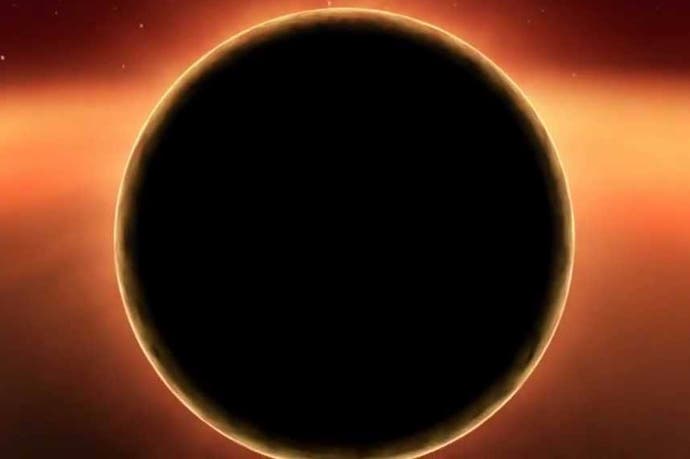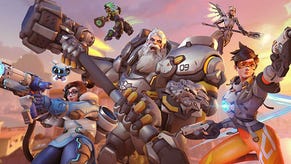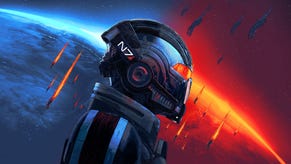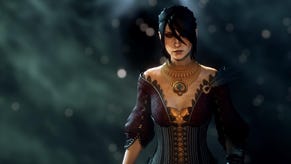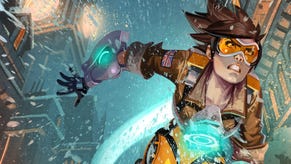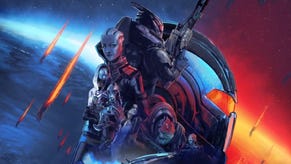Mass Effect's Vigil Theme and the fight to remember
Ghost of a melody.
I remember not being very taken by Mass Effect's main theme, the first time I heard it. Next to what I'd read about the game, a tale of alien liaisons and sizzling gun battles amid the stars, the title music seemed dreary, the wrong kind of spaced-out. A decade later, I listen to it while crossing a certain footbridge in London, on my way to the abandoned mall food court where I'm writing this. Somebody has scrawled "change" plus a few choice sentiments about austerity policies on the wall at one end. The council has repainted that bridge a few times in the years I've lived nearby - right now it's an incongruous green and purple pattern, like a coral reef hammered flat - and every time, that unknown soul has returned to scribble the message anew. A gesture of defiance, or ironic futility? I couldn't tell you, but as the languid drone of Vigil's Theme fills my skull, I read the words again, ponder their relevance to Mass Effect's storyline and find myself ludicrously close to tears.
Every great musical composition is a survivor, struggling against the tides of history. Before written language became ubiquitous, oral artforms such as ballads, folk songs and sung epics were important ways of passing on knowledge from generation to generation - arguably, modern music continues to serve this function alongside other kinds of media, preserving scenes and sensations if not the detail of chronologies. Lyrical structures like rhyme and alliteration have their roots in a wish to codify laws, divine precepts or the genealogies of families in a digestible, memorable form.
As vehicles for knowledge, oral traditions have major downsides. The untimely death of a bard may wipe away decades of learning, and compositions mutate as they are sung or recited, misheard and adapted, losing and acquiring associations in hindsight. A famous example is the English folksong "Ring o Rosie", often taken to be a gruesome taxonomy of Black Plague symptoms, which may actually refer to a game played by 19th century children to sidestep a prohibition on dancing. But these artforms are also enduring in a way other types of preservation are not. The elusive nature of musical memory, stored in several parts of the brain as muscular performance, sensory stimulus, spoken word and malleable abstraction, allows it to weather upheavals both within the life of the individual listener and the life of a community.
Some Alzheimer patients are able to recall tunes and so, "reactivate" impressions or sensations, even as they lose the ability to speak or read. Surviving native American tribes bind themselves together in the face of hardship and creeping cultural homogenisation using ritual song and dance - an especially moving instance is the Boat Dance performed annually by the Hupa tribe in California, despite the choking of their ancestral rivers by hydroelectric companies. The resilience and infectiousness of music also makes it a dependable medium for protest in times of tyranny. You can rip up a tract, burn a painting, delete a hard drive but you can't kill off a catchy tune, as long as there are people to hear it, and if the implications of that tune are forgotten, there's always the possibility that they will be rediscovered.
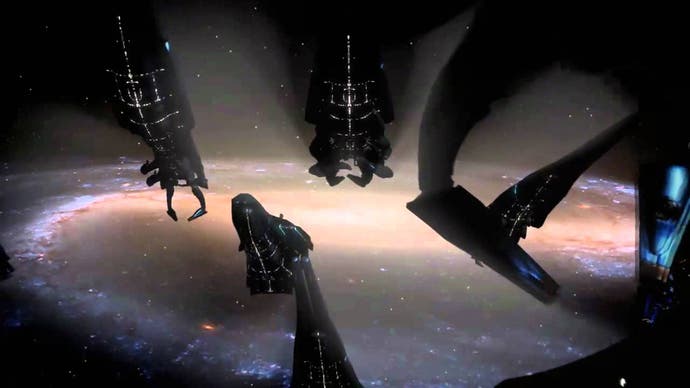
Something of this legacy informs the placing of Vigil's Theme in Mass Effect's story. You won't hear it in-game till the final third, just before a climatic battle at the Citadel, the mysterious, ancient space station that serves as the galactic council's seat of government. By this point, you'll have learned that the galaxy is essentially a gigantic abattoir operated by unfathomably cruel star-faring leviathans known as Reapers, who return from the void every 50,000 years to consume all advanced organic life. Every last fascinating species you've encountered as Shepard - and the name of course takes on a new significance here - is merely biomass fattening under a hothouse lamp, glinting in the cavernous eye sockets of the shapes that cruise the darkness beyond.
You've spent hours chasing one particular Reaper, Sovereign, which stayed behind after the previous annihilation to monitor the herd's regrowth and when the time is ripe, trigger the slaughter. You've lost comrades in the process, and seen others fall to Sovereign's telepathic indoctrination, all without laying a finger on the creature itself. The idea of fending off an entire swarm of such abominations seems impossible. But all is not lost. While pursuing a signal beneath the crust of Ilos, you encounter a ghost, a fractured and dissipating artificial intelligence, freighted with the wisdom of a species eradicated by the Reapers in centuries past.
The entity explains that the majestic, inviting Citadel is, in fact, an enormous trap - a portal to dark space that allows the Reaper fleet to sweep in and devour the societies of every epoch from the inside out. "To stop it you must understand," it urges with what little energy it has left. "Or you will make the same mistakes we did." And as you listen and question, piercing the veil of extinction to hold hands with the dead, you finally hear it again, that medley of astral tones rising from darkness, joined and reinforced by human voices and instruments. The game doesn't just tell you that there is a way to escape the cycle and avert annihilation. It teaches you this at a wrenching, half-conscious level, by resurrecting a track you'll inevitably be overfamiliar with and revealing it for a song of eternity and loss, misery and hope. The Protheans were with you all along, haunting your movements every time you start the game and resume Shepard's story.
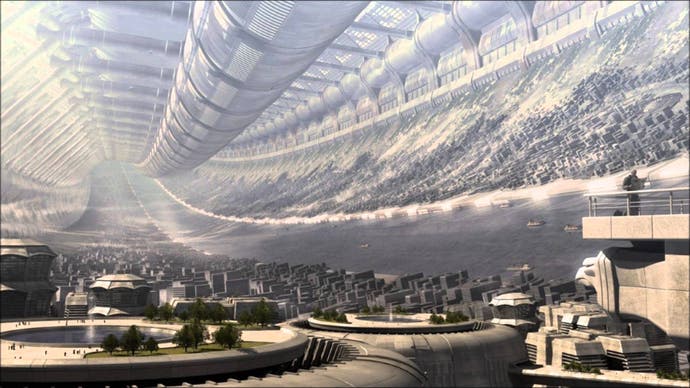
I don't want to make too many grand claims for the broader relevance of all this. Mass Effect is, after all, fundamentally a game about cyber zombies and hook-ups with blue ladies who have shellfish for hair. But I'm struck by the parallels between the Citadel as a trusted yet treacherous institution and many present-day organs of governance. Consider the US constitution, with its 200-year-old provisions about firearms that are used to justify civilian access to military assault rifles in a country that sets world records for gun homicides, or the UK's famously skewed electoral system, which is (supposedly) designed to deliver strong government at the expense of diverse representation. These are frameworks many or most of us take for granted, yet they are at best inadequate to our needs and at worst, actively malignant, tainted by the sins of old. Science fiction is always to some degree the present through a distorted lens, and it's possible to detect in the Citadel's Presidium area - that heavenly expanse of symmetrical walkways, greenery and swooping vistas, all of it basking under a forget-me-not blue sky - a parody of Western democratic monumental traditions and their roots in the architecture of empire and conquest.
The Citadel's role as the galaxy's information hub also speaks to the way civic discourse has been corrupted, as formative conversations about politics and society are carried out on all-pervading digital platforms that weaponise opinions, provide cover for corporate interest and place us all under lifelong surveillance. The lesson is that no social or political apparatus is beyond reproach, however glorified and widely embraced - everything about our civilisation that we choose not to interrogate may be used against us. Sovereign is the tyrant who never quite goes away, always waiting in the wings for an opportunity to wrest back control of democracies that have grown complacent, neglectful of the ground beneath their feet.
The Mass Effect theme, too, is an institution that can be corrupted. You'll hear a sickly, half-digested variation of it while aboard Sovereign itself, as though something of the Prothean civilisation still resonated within the vast, primordial carnivore's tissues. You also hear it at the start of Mass Effect 2, that opening four-note melody flickering in the background like the ghost of a ghost, reflecting Shepard's own destruction and transformation at the hands of the Illusive Man. These are melancholy gestures, but they are also assertions of possibility and continuity - grace notes in a trilogy that is (largely) celebrated for how it retains the effects of your choices between games, writing a history around the evolving figure of Shepard. The fallen may yet live on in the recitation of a verse or the singing of a song, however brutalised and reduced, and their survival is cause for optimism about our own. It's never too late to seek a better world. You just have to listen, and remember.
